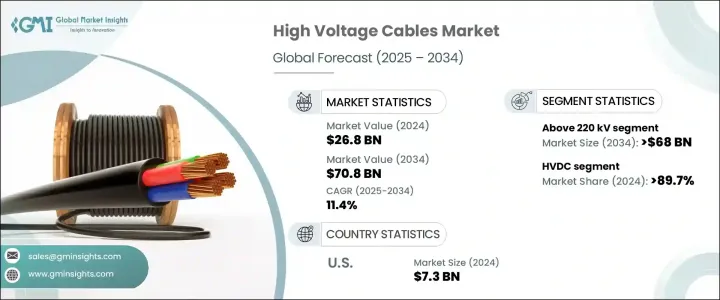
|
시장보고서
상품코드
1699396
고전압 케이블 시장 기회, 성장 촉진요인, 산업 동향 분석 및 예측(2025-2034년)High Voltage Cable Market Opportunity, Growth Drivers, Industry Trend Analysis, and Forecast 2025-2034 |
||||||
세계 고전압 케이블 시장은 2024년에 268억 달러에 달할 것으로 예상되며, 2025-2034년 연평균 11.4%의 성장률을 보일 것으로 예측됩니다.
노후화된 전력 인프라의 업그레이드 및 개보수에 대한 관심이 높아지고 있으며, 전 세계적으로 전력망 확장에 대한 막대한 투자가 이루어지고 있는 것도 산업 성장을 가속하고 있습니다. 특히 신흥 경제 국가들은 기존 전력 인프라의 격차를 해소하기 위해 신뢰할 수 있고 효율적인 전력망 시스템 개발에 우선순위를 두고 있습니다. 에너지 수요 증가로 인해 전력망 현대화 노력이 강화되고 있으며, 민관 모두 이러한 전환을 지원하기 위해 많은 투자를 하고 있습니다. 또한, 재생 가능 에너지원의 통합을 위한 움직임으로 인해 첨단 전송 기술의 필요성이 증가하고 있습니다. 지하 및 해저 케이블 시스템의 도입이 진행됨에 따라 지속가능성이 더욱 강화되고, 신뢰성과 환경 보호 측면에서 장기적인 이점을 가져다 줄 수 있습니다.

케이블 산업은 전압에 따라 110kV 미만, 110kV-220kV, 220kV 이상의 세 가지 부문으로 분류되며, 110kV 미만 케이블은 주로 도시 배전망과 재생에너지 연결을 지원합니다. 이 분야는 급속한 도시화와 안정적인 배전망 수요로 인해 2034년까지 연평균 25% 이상의 성장률을 보일 것으로 예상됩니다. 도시 지역의 인구 증가와 진행 중인 인프라 프로젝트로 인해 보급이 확대될 것으로 예상됩니다.
| 시장 범위 | |
|---|---|
| 시작 연도 | 2024년 |
| 예측 연도 | 2025-2034년 |
| 시작 금액 | 268억 달러 |
| 예상 금액 | 708억 달러 |
| CAGR | 11.4% |
고전압 케이블도 HVAC와 HVDC로 분류되며, HVDC 부문은 2024년 시장 점유율의 89.7% 이상을 차지하며 업계에서 우위를 점하고 있습니다. 장거리 전력 손실을 줄이기 위해 설계된 대용량 도체의 채택은 HVDC 시장의 확장을 강화하고 있습니다. 비용 효율성이 뛰어나고 대규모 에너지 전송에 효율적이기 때문에 특히 대규모 그리드 네트워크에 대한 도입이 가속화되고 있습니다. 송전 중 에너지 손실을 최소화하고 장거리 송전을 지원하는 것에 대한 관심이 높아지면서 HVDC 기술에 대한 수요가 더욱 증가하고 있습니다.
미국 고전압 케이블 시장은 2022년 1억 달러, 2023년 5,000만 달러, 2024년 73억 달러로 상당한 금액의 변동이 있을 것으로 예상됩니다. 재생에너지 프로젝트에 대한 투자 증가, 전력망 현대화 진행, 신뢰할 수 있는 전력망에 대한 필요성 증가로 인해 시장은 더욱 확대될 것으로 예상됩니다. 지속가능성 목표를 달성하고 전력 분배를 개선하기 위해 에너지 인프라를 강화하는 데 중점을 두고 있는 것이 업계의 지속적인 성장에 기여하고 있습니다.
목차
제1장 조사 방법과 조사 범위
제2장 주요 요약
제3장 업계 인사이트
- 생태계 분석
- 규제 상황
- 업계에 대한 영향요인
- 성장 촉진요인
- 업계의 잠재적 리스크&과제
- 성장 가능성 분석
- Porter's Five Forces 분석
- PESTEL 분석
제4장 경쟁 구도
- 전략 대시보드
- 혁신과 지속가능성 전망
제5장 시장 규모와 예측 : 전압별, 2021년-2034년
- 주요 동향
- 110kV 미만
- 110kV-220kV
- 220kV 이상
제6장 시장 규모와 예측 : 전류별, 2021년-2034년
- 주요 동향
- HVAC
- HVDC
제7장 시장 규모와 예측 : 설치별, 2021년-2034년
- 주요 동향
- 가공
- 해저
- 지중
제8장 시장 규모와 예측 : 지역별, 2021년-2034년
- 주요 동향
- 북미
- 미국
- 캐나다
- 유럽
- 독일
- 이탈리아
- 스페인
- 네덜란드
- 영국
- 아시아태평양
- 중국
- 일본
- 인도
- 태국
- 인도네시아
- 세계 기타 지역
- 브라질
- 멕시코
- 남아프리카공화국
제9장 기업 개요
- alfanar Group
- Brugg Kabel
- Ducab
- Elsewedy Electric
- Furukawa Electric
- Gupta Power
- Iljin Electric
- Jeddah Cables
- LS Cable &System
- Mitsubishi Electric
- Nexans
- NKT
- Power Plus Cable
- Prysmian Group
- Riyadh Cables
- Southwire Company
- Sumitomo Electric Industries
- Taihan Cables &Solution
- TF Kable
- ZMS Cable
- ZTT
The Global High Voltage Cable Market reached USD 26.8 billion in 2024 and is projected to expand at a CAGR of 11.4% from 2025 to 2034. The increasing focus on upgrading and refurbishing aging electrical infrastructure, along with significant investments in grid network expansion worldwide, is driving industry growth. Emerging economies, in particular, are prioritizing the development of reliable and efficient grid systems to address gaps in their existing power infrastructure. The rising energy demand has intensified efforts to modernize electrical networks, with both public and private sectors investing heavily to support this transition. Additionally, the push toward integrating renewable energy sources has contributed to the need for advanced transmission technologies. The growing deployment of underground and subsea cable systems is further enhancing sustainability, offering long-term benefits in terms of reliability and environmental protection.

The industry categorizes cables based on voltage into three segments: below 110 kV, 110 kV to 220 kV, and above 220 kV. Cables under 110 kV primarily support urban distribution networks and renewable energy connections. This segment is forecasted to expand at a CAGR exceeding 25% by 2034 due to rapid urbanization and the demand for stable power distribution networks. Expanding populations in urban areas, along with ongoing infrastructure projects, are expected to drive widespread adoption.
| Market Scope | |
|---|---|
| Start Year | 2024 |
| Forecast Year | 2025-2034 |
| Start Value | $26.8 Billion |
| Forecast Value | $70.8 Billion |
| CAGR | 11.4% |
High voltage cables are also classified into HVAC and HVDC categories. The HVDC segment accounted for over 89.7% of the market share in 2024, demonstrating its dominance in the industry. The adoption of high-capacity conductors designed to reduce power losses over long distances is reinforcing HVDC market expansion. Its cost-effective nature and efficiency in large-scale energy transmission are accelerating deployment, particularly for extensive grid networks. The increasing focus on minimizing energy loss during transmission and supporting long-distance power transfers is further boosting the demand for HVDC technology.
The U.S. high voltage cable market has experienced notable fluctuations in value, reaching USD 0.1 billion in 2022, USD 0.05 billion in 2023, and USD 7.3 billion in 2024. The market is set to witness further expansion due to rising investments in renewable energy projects, ongoing modernization of electric grids, and the growing necessity for a reliable power transmission network. The emphasis on strengthening energy infrastructure to meet sustainability goals and improve electricity distribution is contributing to sustained industry growth.
Table of Contents
Chapter 1 Methodology & Scope
- 1.1 Market definitions
- 1.2 Base estimates & calculations
- 1.3 Forecast calculation
- 1.4 Data sources
- 1.4.1 Primary
- 1.4.2 Secondary
- 1.4.2.1 Paid
- 1.4.2.2 Public
Chapter 2 Executive Summary
- 2.1 Industry synopsis, 2021 – 2034
Chapter 3 Industry Insights
- 3.1 Industry ecosystem analysis
- 3.2 Regulatory landscape
- 3.3 Industry impact forces
- 3.3.1 Growth drivers
- 3.3.2 Industry pitfalls & challenges
- 3.4 Growth potential analysis
- 3.5 Porter's analysis
- 3.5.1 Bargaining power of suppliers
- 3.5.2 Bargaining power of buyers
- 3.5.3 Threat of new entrants
- 3.5.4 Threat of substitutes
- 3.6 PESTEL analysis
Chapter 4 Competitive landscape, 2024
- 4.1 Strategic dashboard
- 4.2 Innovation & sustainability landscape
Chapter 5 Market Size and Forecast, By Voltage, 2021 – 2034 (km, USD Billion)
- 5.1 Key trends
- 5.2 < 110 kV
- 5.3 110 kV - 220 kV
- 5.4 > 220 kV
Chapter 6 Market Size and Forecast, By Current, 2021 – 2034 (km, USD Billion)
- 6.1 Key trends
- 6.2 HVAC
- 6.3 HVDC
Chapter 7 Market Size and Forecast, By Installation, 2021 – 2034 (km, USD Billion)
- 7.1 Key trends
- 7.2 Overhead
- 7.3 Submarine
- 7.4 Underground
Chapter 8 Market Size and Forecast, By Region, 2021 – 2034 (km, USD Billion)
- 8.1 Key trends
- 8.2 North America
- 8.2.1 U.S.
- 8.2.2 Canada
- 8.3 Europe
- 8.3.1 Germany
- 8.3.2 Italy
- 8.3.3 Spain
- 8.3.4 Netherlands
- 8.3.5 UK
- 8.4 Asia Pacific
- 8.4.1 China
- 8.4.2 Japan
- 8.4.3 India
- 8.4.4 Thailand
- 8.4.5 Indonesia
- 8.5 Rest of World
- 8.5.1 Brazil
- 8.5.2 Mexico
- 8.5.3 South Africa
Chapter 9 Company Profiles
- 9.1 alfanar Group
- 9.2 Brugg Kabel
- 9.3 Ducab
- 9.4 Elsewedy Electric
- 9.5 Furukawa Electric
- 9.6 Gupta Power
- 9.7 Iljin Electric
- 9.8 Jeddah Cables
- 9.9 LS Cable & System
- 9.10 Mitsubishi Electric
- 9.11 Nexans
- 9.12 NKT
- 9.13 Power Plus Cable
- 9.14 Prysmian Group
- 9.15 Riyadh Cables
- 9.16 Southwire Company
- 9.17 Sumitomo Electric Industries
- 9.18 Taihan Cables & Solution
- 9.19 TF Kable
- 9.20 ZMS Cable
- 9.21 ZTT











